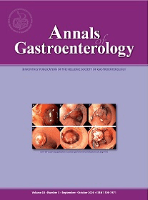
Annals of Gastroenterology
Scope & Guideline
Transforming Gastroenterology Through Rigorous Scholarship
Introduction
Aims and Scopes
- Clinical Gastroenterology:
Focuses on clinical aspects of gastrointestinal diseases, including diagnosis, treatment, and outcomes of conditions like inflammatory bowel disease, liver diseases, and gastrointestinal malignancies. - Endoscopic Techniques and Innovations:
Covers advancements in endoscopic procedures, including methodologies, efficacy, and safety of techniques such as endoscopic ultrasound, endoscopic retrograde cholangiopancreatography, and submucosal dissection. - Epidemiology and Public Health:
Explores the epidemiological trends, risk factors, and public health implications of gastrointestinal diseases, with a focus on population studies and health outcomes. - Multidisciplinary Approaches:
Highlights the importance of multidisciplinary care in managing complex gastrointestinal disorders, integrating insights from various healthcare professionals. - Emerging Therapies and Pharmacology:
Investigates new therapeutic options, including pharmacological treatments, biologics, and their effects on gastrointestinal conditions.
Trending and Emerging
- Artificial Intelligence and Machine Learning:
The integration of AI and machine learning in gastroenterology is gaining momentum, particularly in diagnostic imaging and predictive analytics for treatment outcomes. - Gut Microbiome Research:
Emerging studies on the gut microbiome's role in health and disease are becoming more prevalent, emphasizing its impact on conditions like inflammatory bowel disease and metabolic disorders. - Telemedicine and Remote Care:
The rise of telemedicine as a response to the COVID-19 pandemic has led to increased research on its effectiveness and application in managing gastrointestinal diseases. - Personalized Medicine:
There is a growing focus on personalized treatment strategies in gastroenterology, particularly in the management of chronic conditions such as inflammatory bowel disease and liver diseases. - Psychosocial Factors in Gastroenterology:
Research exploring the psychosocial aspects of gastrointestinal diseases, including the impact of mental health on disease management and patient outcomes, is gaining traction.
Declining or Waning
- Traditional Surgical Techniques:
Research on traditional surgical interventions for gastrointestinal diseases has decreased, as innovative minimally invasive techniques gain traction and become the standard. - Basic Science Research:
There is a noticeable decline in the publication of basic science studies related to gastrointestinal physiology and pathophysiology, as the focus shifts towards clinical and translational research. - Longitudinal Studies:
Fewer longitudinal studies are being published, possibly due to the increasing preference for retrospective analyses and systematic reviews that provide immediate clinical relevance. - Conventional Imaging Techniques:
The exploration of traditional imaging modalities such as X-rays and CT scans has waned, with a growing emphasis on advanced imaging techniques like MRI and endoscopic ultrasound.
Similar Journals

DIGESTIVE DISEASES AND SCIENCES
Fostering innovation in gastroenterology research.DIGESTIVE DISEASES AND SCIENCES, a renowned journal published by Springer, plays a pivotal role in advancing the fields of gastroenterology and physiology. With a rich publication history spanning from 1979 to 2024, this journal not only holds an impressive Q1 ranking in both categories but also ranks 34th out of 167 in Gastroenterology and 60th out of 193 in Physiology according to Scopus, reflecting its significant impact and reputation within the academic community. Despite being a traditional journal without open access options, it remains a crucial platform for researchers, professionals, and students seeking to disseminate their findings and stay abreast of the latest developments in digestive health. The journal is accessible to a global audience and is dedicated to publishing high-quality, peer-reviewed research, making it an invaluable resource for anyone involved in the study or treatment of digestive diseases.
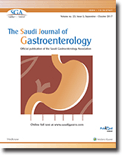
Saudi Journal of Gastroenterology
Empowering knowledge for better digestive health.The Saudi Journal of Gastroenterology is a premier platform dedicated to advancing research and clinical practice in the field of gastroenterology. Published by Wolters Kluwer Medknow Publications, this open-access journal has been serving the academic community since 1995 from its base in India. With an ISSN of 1319-3767 and an E-ISSN of 1998-4049, the journal allows unrestricted access to a wealth of knowledge, fostering an environment where researchers, professionals, and students can engage with cutting-edge studies. As of 2023, it is categorized in the Q3 quartile within gastroenterology, ranking #74 out of 167 in Scopus, which places it within the 55th percentile of its field. The journal aims to disseminate significant findings, clinical trials, and innovative theories that shape the understanding of gastrointestinal disorders and practices. With a commitment to quality and relevance, the Saudi Journal of Gastroenterology is pivotal for anyone seeking to enhance their knowledge and expertise in this vital area of medicine.
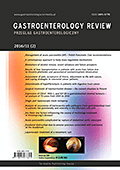
Gastroenterology Review-Przeglad Gastroenterologiczny
Pioneering Insights in Gastrointestinal MedicineGastroenterology Review-Przeglad Gastroenterologiczny is a premier, peer-reviewed journal published by TERMEDIA PUBLISHING HOUSE LTD, focusing on the dynamic field of gastroenterology. Since its inception in 2006, it has embraced an Open Access model, ensuring that the latest research is readily accessible to a global audience, fostering collaboration and innovation. Based in Poland, this journal serves as a crucial platform for disseminating significant findings in gastrointestinal research, with a current Scopus rank placing it at the 39th percentile in its category. With a commitment to advancing the understanding of gastroenterological conditions, *Gastroenterology Review* publishes original articles, reviews, and case studies that contribute to both clinical practice and academic research. The journal is particularly aimed at researchers, healthcare professionals, and students who ignite dialogues that shape the future of gastrointestinal health. Explore the comprehensive insights that this journal offers, as it encapsulates vital developments from 2008 to 2024 in the ever-evolving landscape of gastroenterology.

Gastroenterology Research
Transforming patient care with cutting-edge studies.Gastroenterology Research is a prominent scholarly journal dedicated to advancing the field of gastroenterology. Published by ELMER PRESS INC, this journal serves as a vital platform for disseminating innovative research, clinical findings, and comprehensive reviews that explore the complexities of the gastrointestinal system. With an ISSN of 1918-2805 and an E-ISSN of 1918-2813, it reaches a global audience of researchers, healthcare professionals, and students eager to contribute to or keep abreast of the latest developments in gastroenterology. Though details such as the H-index and Scopus rankings are currently unspecified, the journal's commitment to quality and impact in the medical research community is evident. Gastroenterology Research aims to foster collaboration and knowledge sharing among experts, ultimately improving patient care and outcomes within this critical area of health science. Explore the cutting-edge studies published within its pages and engage with a community passionate about the investigation and treatment of gastrointestinal diseases.

DIGESTION
Fostering dialogue and insights in the world of digestion.DIGESTION is a prestigious journal dedicated to advancing the field of gastroenterology, published by KARGER, a renowned publisher based in Switzerland. With a rich history dating back to 1896, this journal has continuously evolved and serves as a vital platform for researchers, professionals, and students alike. DIGESTION is recognized for its scholarly contributions, holding an impressive rank of 23 out of 167 in the Scopus database, placing it within the top 14% of gastroenterology journals, as evidenced by its Q2 classification. The journal's commitment to high-quality research is reflected in its wide-ranging scope, addressing various aspects of digestive health, clinical practices, and innovative therapies. Though not an open-access journal, it provides comprehensive access options that ensure the dissemination of crucial research findings to the global community. As we move towards 2024, DIGESTION continues to facilitate dialogue and insights in gastroenterological research, making it an indispensable resource for those in the field.

Indian Journal of Gastroenterology
Bridging Research and Practice in Gastrointestinal HealthThe Indian Journal of Gastroenterology, a prominent publication in the field of gastroenterology, is published by Springer India. With roots dating back to 1982 and an ongoing commitment to disseminating high-quality research, this journal serves as a vital platform for researchers, practitioners, and students interested in gastrointestinal health and diseases. It boasts an impressive track record with a Scopus rank of #82 in the gastroenterology category and a 2023 quartile ranking of Q3, firmly situating it within the competitive landscape of medical journals. Although it is not an open-access journal, the Indian Journal of Gastroenterology offers accessible research articles contributing significantly to the field, facilitating informed discussion and advancing knowledge in gastrointestinal medicine. The journal's comprehensive focus covers a wide range of topics from clinical studies to innovative therapeutic approaches, ensuring its relevance to current medical practices and the evolving challenges in gastroenterology.
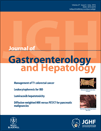
JOURNAL OF GASTROENTEROLOGY AND HEPATOLOGY
Advancing knowledge in gastrointestinal and liver health.Welcome to the JOURNAL OF GASTROENTEROLOGY AND HEPATOLOGY, an esteemed publication in the field of gastroenterology and hepatology, proudly published by WILEY. Established in 1986, this journal serves as a crucial platform for researchers, healthcare professionals, and students, presenting groundbreaking research and comprehensive reviews that drive advances in understanding and treating gastrointestinal and liver diseases. With a strong reputation evidenced by its Q1 ranking in gastroenterology and Q2 ranking in hepatology, this journal ranks impressively in the Scopus metrics - positioned at #22 out of 167 in gastroenterology and #21 out of 82 in hepatology, reflecting its contribution to scholarly excellence. Although it does not offer open access options, the journal’s rich archive and diverse topics make it indispensable for those dedicated to improving patient outcomes in these critical areas of medicine. Whether you are a seasoned researcher or an aspiring medical professional, engaging with this journal will keep you at the forefront of the latest developments and emerging trends in gastroenterology and hepatology research.
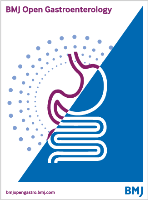
BMJ Open Gastroenterology
Unveiling Cutting-Edge Discoveries in GastroenterologyBMJ Open Gastroenterology is a premier open access journal published by the esteemed BMJ Publishing Group, focusing on the dynamic and evolving field of gastroenterology. Established in 2014, the journal has rapidly ascended in stature, reflected in its impressive 2023 Q1 ranking in gastroenterology and its position within the top 25% of journals in the category according to Scopus. With a mission to disseminate high-quality, peer-reviewed research with global significance, the journal provides a vital platform for researchers, professionals, and students alike to share their findings and advancements in gastrointestinal medicine. Operating from its headquarters in London, England, the journal's open access format ensures wide visibility and accessibility of cutting-edge research, making it an invaluable resource for those dedicated to improving patient care and driving innovation in gastroenterological sciences. By engaging with this journal, contributors and readers can stay at the forefront of critical developments in the field, fostering a collaborative environment for knowledge exchange.

Clinical Gastroenterology and Hepatology
Advancing the Frontiers of Gastroenterology and HepatologyClinical Gastroenterology and Hepatology, published by Elsevier Science Inc, stands as a leading journal in the fields of gastroenterology and hepatology. With an ISSN of 1542-3565 and an E-ISSN of 1542-7714, this esteemed publication has earned its place in the top quartile (Q1) of both gastroenterology and hepatology categories as of 2023, ranking 6th out of 167 and 7th out of 82 respectively. The journal aims to disseminate innovative research, clinical studies, and case reports that advance the understanding and treatment of gastrointestinal and liver diseases. Targeted towards researchers, healthcare professionals, and students, it provides crucial insights into emerging therapies and medical advancements. Clinical Gastroenterology and Hepatology is not only a pivotal resource for contemporary gastroenterological research but also fosters collaboration and knowledge-sharing within the medical community. With a converging publication history from 2003 to the present, the journal continues to build on its solid foundation of scientific excellence and relevance.

Frontline Gastroenterology
Exploring the Depths of Digestive ScienceFrontline Gastroenterology is a leading academic journal published by the BMJ Publishing Group that plays a vital role in advancing the field of gastroenterology and hepatology. Established in 2013, this prestigious journal has established itself as a significant resource for researchers, healthcare professionals, and students alike, maintaining a commendable impact factor and consistently achieving a Q2 ranking in both gastroenterology and hepatology categories as of 2023. With its focus on disseminating high-quality, peer-reviewed research, Frontline Gastroenterology covers a wide scope of topics pertinent to the understanding, diagnosis, and treatment of gastrointestinal and liver diseases. Although it does not offer Open Access options, its content is accessible through various institutional and personal subscriptions, ensuring that critical findings reach an international audience. As the journal continues to converge into the future, it remains dedicated to fostering innovation and dialogue in gastroenterological sciences.